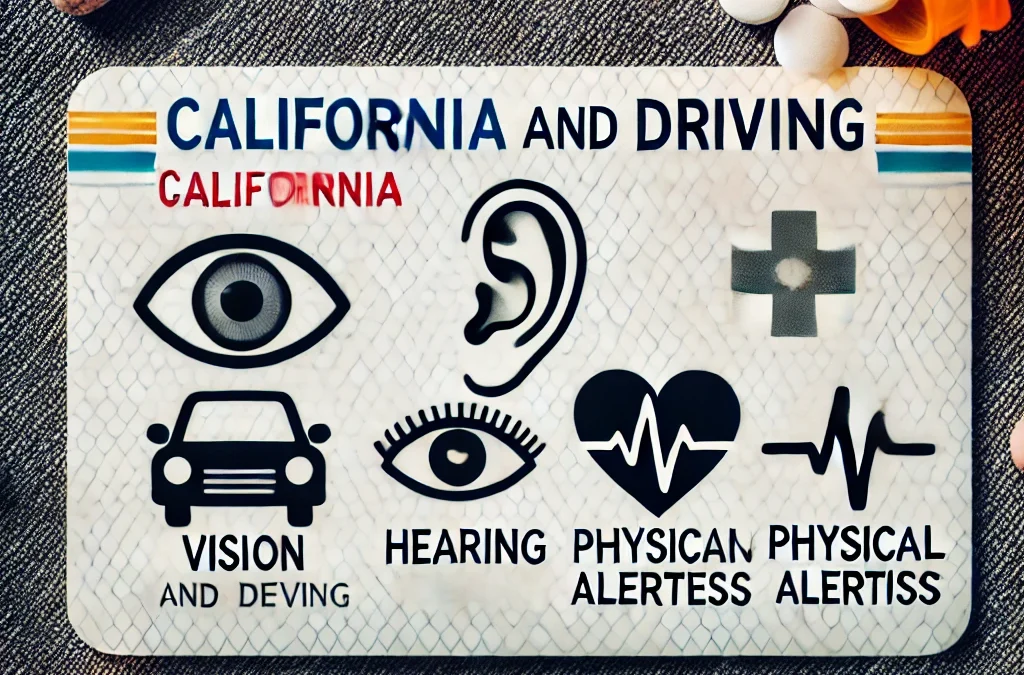How Your Health May Affect Your Driving
Safe driving requires physical, mental, and emotional readiness, and your health can significantly impact your ability to operate a vehicle. Understanding how different health factors may affect your driving is crucial for ensuring your safety and the safety of others on the road. Here’s a breakdown of how various aspects of your health can influence your driving abilities.
Vision
Good vision is essential for safe driving. You need to be able to notice hazards in various conditions, including different types of lighting, and to judge distances. Vision is also important for reading road signs, adjusting to traffic speed, and identifying obstacles on the road.
- Key Considerations: If you have difficulty seeing at night or in low-light conditions, or if you need corrective lenses, ensure you wear them while driving. The DMV may place restrictions on your driver’s license if you rely on glasses or contact lenses.
Hearing
Hearing plays an important role in safe driving, as it helps you detect sounds like horns, sirens, motorcycles, or screeching tires that could alert you to potential hazards.
- Key Considerations: It is illegal to wear a headset or earplugs in both ears while driving. Being able to hear warning signals is vital for responding to emergencies or changes in traffic conditions.
Fatigue and Drowsiness
Driving when you’re fatigued or drowsy can significantly impair your ability to react to hazards. Fatigue reduces your alertness and slows your reaction time, making it harder to spot and respond to dangers on the road.
- Key Considerations: If you are feeling tired or drowsy, it’s best to avoid driving until you are fully alert. Consider taking breaks on long trips to stay refreshed.
Physical and Mental Alertness
Being physically and mentally alert is essential for making quick decisions while driving. Whether it’s reacting to sudden obstacles, other vehicles, or unexpected road conditions, staying focused is critical.
- Key Considerations: Avoid distractions and stay mentally engaged while driving. Make sure you are physically fit to control the vehicle, especially during long drives.
Medications
Both prescription and over-the-counter medications can affect your driving abilities. Some medications may cause drowsiness, slower reaction times, or dizziness, making you unsafe behind the wheel.
- Key Considerations: It is your responsibility to understand the side effects of any medications you take. If a medication makes you drowsy, it’s best to avoid driving.
Health Conditions and Reporting
Physicians are required to report patients who are at least 14 years old to the DMV if they believe the patient has medical conditions that could impair their ability to drive safely. This includes conditions that may cause lapses in consciousness, such as epilepsy or other medical disorders that could lead to sudden incapacitation.
- Key Considerations: If you have a health condition that may affect your ability to drive, speak to your doctor about how to manage your condition and whether it might affect your driving. If necessary, follow DMV regulations for reporting health conditions.
Conclusion
Your health plays a vital role in your ability to drive safely. By being aware of how your vision, hearing, physical and mental alertness, medications, and health conditions can impact your driving, you can make better decisions and avoid accidents. Always monitor your health and be mindful of how it might affect your driving performance.
If you are unsure whether your health condition may affect your driving, consult with a physician and stay informed about DMV regulations related to health and driving.






Recent Comments